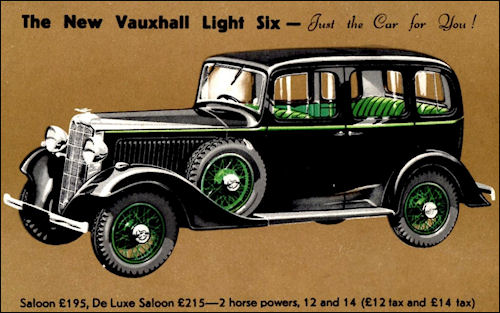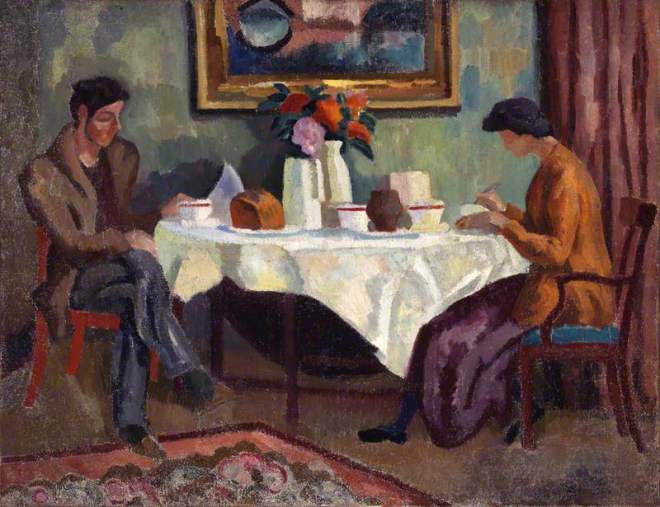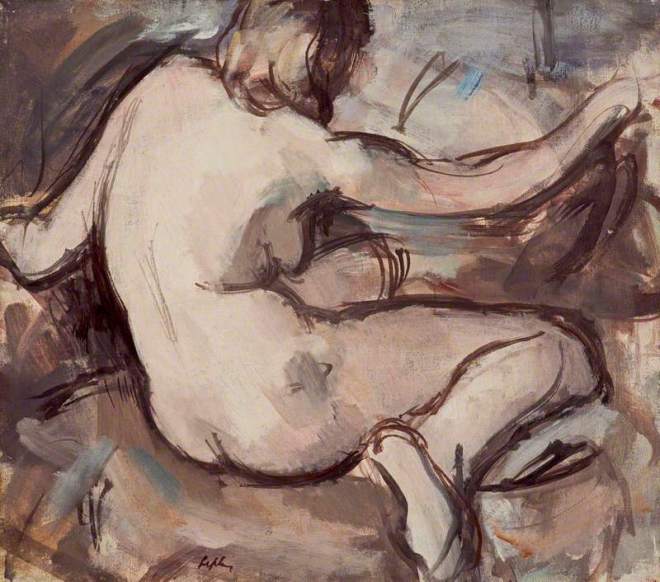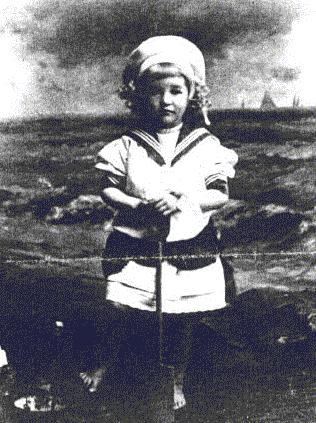The workhouse in the title of this collection is no Victorian institution for the destitute, but a philanthropic retreat for writers and painters, a large country house, set in a large park, with a large kitchen garden. Hetherston Hall is reigned over by the philanthropist’s widow who provides board and lodging and occasional advice, more practical than artistic. Recognising a case of writer’s block in one of ‘her’ young authors, Mrs Lucas cites previous visitors, Mr Doherty, the poet, who used to find regular exercise beneficial, and ‘Miss – I forget her name – pretty red-haired girl –plays in verse, I think. She found the best thing was whisky.’ Cecilia Mathers doesn’t mention that she has already, to no avail, been spending her days in the kitchen garden, picking strawberries and hoeing between the lettuces.
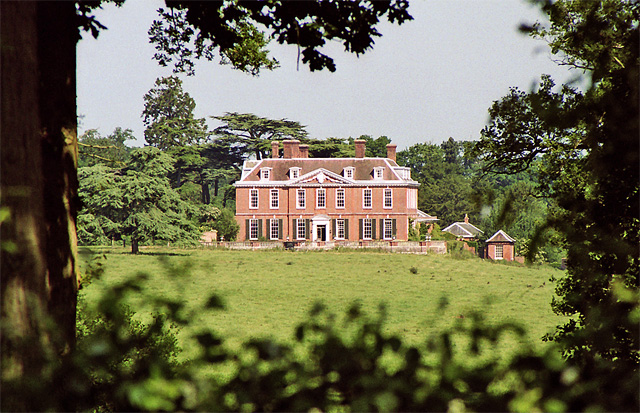
The solution turns out to lie elsewhere. Missing her path on a solitary night walk and finding herself alarmed (though not excessively) by a herd of curious heifers, Cecilia is ‘rescued’ by the current Hetherston ‘celeb’, a recently divorced, successful author, escaping his mistress. A midnight fumble on the sofa, routine for him, easily rebuffed by her, triggers startlingly vivid memories of a past lover as she climbs the stairs to her room: his pigskin stud-box, polished with use, and the lotion he used after shaving, too expensive to smell vulgar. ‘All I needed,’ she imagines herself saying to Mrs Lucas, ‘was to have my bottom pinched, so to speak, by a best-selling novelist in a yellow waistcoat.’ Cecilia has her story. ‘Things were hooking onto each other – smells, words, gestures – not yet amounting to a sequence of events but weaving a feeling of Max … I’ll call him Louis, she thought …’.
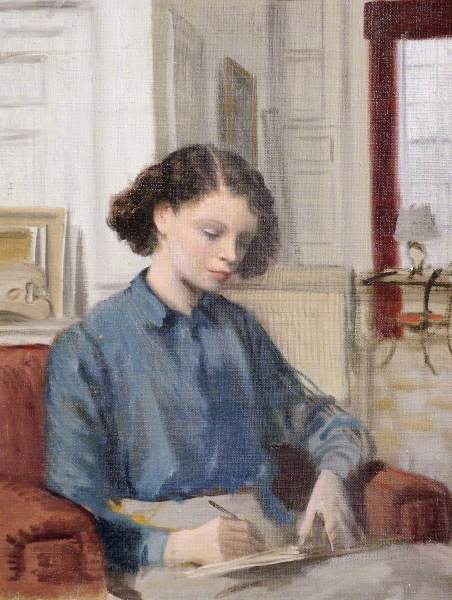
The American collection of Diana Athill’s short stories took its title from the first story she wrote, ‘An Unavoidable Delay’, whose genesis she recalls in the Preface to the Persephone collection, and which she described at slightly greater length in her memoir Instead of a Letter (1963), briefly, concluding: ‘The story came straight out with no pause, exactly as I meant it to, and I was perfectly happy all the time it was coming.’ The experience sounds almost prosaic by comparison with Cecilia’s.
‘Midsummer Night in the Workhouse’ is a better choice of title story. Longer, and with a far larger cast than the others, it is written with the keen eye for detail, sharp ear for dialogue, succinctness and, not least, humour that characterises the whole collection. Elements of all the principal themes are there, many autobiographical, about which the author makes no secret: childhood, sex, relationships between men and women, women’s choices and independence, addressed with a cool frankness and in a manner way ahead of their time. Age has not tempered Diana Athill’s frankness: before I could download her fascinating interview with Alan Yentob in 2010, one of the BBC arts series Imagine (available on BBC iPlayer), I had to click on the box confirming that I was ‘over 16’, having first been warned of ‘strong language’.
In her own relationships Athill determined, after two deeply unhappy episodes, that it was best to ‘avoid romanticism and abhor possessiveness.’ She wrote of herself that until her forties she could be at ease only in a relationship which she knew to be ‘trivial’. The collection reflects this. Cecilia’s affair with Max, the inspiration for her story, had been short and sweet, without a bad ending, ‘her one painless affair’ – a telling aside, easily missed. In ‘An Unavoidable Delay’ Rose, travelling alone through Yugoslavia, has enjoyed a brief flirtation with an architect until he remarks how unfortunate it is that English women should be married to English husbands: ‘Rose always hoped that foreigners would not make this remark but they usually did.’ ‘Always’ and ‘usually’, two words suffice: it’s clear that this is far from being her first foreign flirtation, and we’re not surprised when she rapidly embarks on another. When Philip Dwight leaves a party with another man’s wife (‘A Hopeless Case’), and dinner segues into bed, we are lulled into believing that he is a habitually wronged husband, finally reacting to his wife’s blatant intimacy with a fellow guest. What a surprise when we read that ‘neither of Philip’s two other infidelities had been so simple’. So he too has form. But there is something touching about the ‘two’. Such a short sentence and so much information.
The Dwights have been married for eight years. Philip is unsurprised that his wife should want another man. ‘They no longer had much to talk about, he was only mildly interested in her pottery classes and her beagle puppies, and she wasn’t interested at all in his work.’ Rose has been escaping an alcoholic, suicidal husband whose letters she barely opens: ‘What was in the letters, Rose knew, was that if she left Neville he would throw up his job, start drinking again and (in the twelve-page letter, probably) put his head in the gas oven.’ How flatly comedic is that ‘probably’, and what a depressing summary of a relationship. Reflecting on the (few) advantages of marriage, Rose lists house, money, friends, and reminds herself of the nursery exhortation to ‘think of all the little boys and girls who haven’t got any rice pudding … lucky little bastards, thought Rose, as always…’ The Beestons (‘For Rain It Hath a Friendly Sound’) have made twelve years, but only thanks to Kate Beeston’s outward submission, sending ‘many of her inclinations underground rather than contend with him as he settled in ways she had not expected.’ Clearly, negotiation is not an option, if it ever was. Midsummer Night in the Workhouse doesn’t make much of a case for marriage. Only one appears to be satisfactory, that of the doctor with whom Kate falls in love, who allows his wife all the freedom she wants, while enjoying his own to the full. ‘It was simply that he loved his wife with generosity,’ reflects Kate. The more cynical view, not Athill’s, is that the couple, more or less, put up with their respective infidelities, or it may be – we are invited to see things only from the husband’s point of view – that her holidays away are the price he is more than willing to pay for his extramarital affairs.
Describing marriage as ‘living somebody else’s life’, Athill has made no secret of the fact that what suited her was being ‘the other woman’, comparing it to enjoying the plums without having to munch too much through the pudding. She is not ungrateful to those women who munch the pudding, washing the socks and shirts and dealing with illness. Without wives after all there can be no ‘other women’. She leaves us in no doubt that, long-term, women are stronger without men. Maybe men too are stronger alone. Lovers are better enjoyed as guests rather than live-in lodgers.
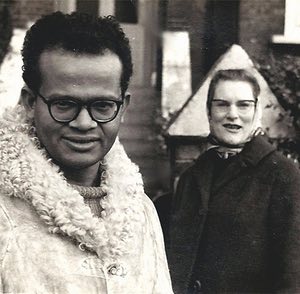
In ‘The Island’ the cracks are showing after just three years in a match based, unreliably, on the fact that ‘the parts of each of them which had not changed since childhood happened to be at home together’. The ease of shared childhood experience is a lure, but one to be resisted. Elizabeth slips back easily, too easily, into the familiar environment of a large country house (‘A Weekend in the Country’), similar (like the writer’s retreat in ‘Midsummer Night in the Workhouse’ and the family home in the final story) to Ditchingham Hall in Norfolk, where Diana Athill, happily, spent much of her childhood with her grandparents. Elizabeth wisely turns down an offer of marriage, Cecilia returns to her own awkward flat, and in ‘Burial’ Mrs Klein , who has long ago cast off the trappings of her conventional upper-middle-class upbringing to marry a Jewish Socialist (an outsider of the kind to whom the author might herself have been attracted) resists the needs of her unhappy brother. A secure childhood is important, but it cannot usefully be revisited.
Athill says of herself that she is one of those people who are hardly ever totally involved in an emotion, ‘there’s always a beady-eyed watcher at the back of my mind.’ Clinically observing emotions, she grounds her characters, often humorously, in practicalities. Preparing to lose her virginity to her boyfriend, Jane (‘No Laughing Matter’) plans to borrow a friend’s suitcase for the weekend, ‘because Nora’s surname, like Stephen’s, began with M’. Having dealt with the likely disapprobation of the hotel receptionist, her next problem is contraception: she knows that Charing Cross Road is the place to go, ‘because there they put them in the windows and on the counters even, you could point – but on her way back at the end of the vacation she would only just have time enough to make her connection and Charing Cross Road was in the wrong direction.’ How absurd if the awkwardness of the train timetable were to be the cause of a pregnancy.
A panoply of material details enriches every story. A Greek fisherman, is ‘scraggy at the table over his plate of beans in oil’; toffee papers and husks of monkey nuts lie under a park bench; strawberries are picked into a punnet ‘lined with a cabbage leaf’ (a detail from her own childhood). The Soho street described in the opening paragraph of ‘An Afternoon Off’ glows with life: ‘a string of onions hung above a wicker basket of red peppers, two copper moulds in the shape of fish crowned an arrangement of wooden pepper-mills, and an old man with one arm played a small concertina strapped to his chest and a Negro or half-Negro prostitute with blonde hair wore a sugar-pink duffel coat.’ Only one determined to ‘get it like it was’ (Jean Rhys’s dictum) would bother to specify the possible racial mix of the young woman, or the exact pink of her coat, details which are both superfluous and brilliant. Only a ‘beady eye’ would pick out the sad comedy of the one-armed musician.
Like a lot of lives, hers, says Athill, has contained unhappy things, the essence of it being that it has been lucky. ‘Funny, nice and lucky.’ We know that Diana Athill herself suffered a cruel humiliation during her time at Oxford similar to Jane’s in ‘No Laughing Matter’, and was greatly hurt by it, but that story too ends on an up-beat, ‘I’ll get over this one day. I’m only nineteen so I’ll probably get over it quite soon, and I’ll love someone else.’ That little phrase ‘quite soon’ has such a young, almost childlike, confident ring. Her short stories contain unhappy things, but we would be wrong to conclude that they are sad. Relationships end for the right reasons. Good sense prevails. The clouds we sense will clear.
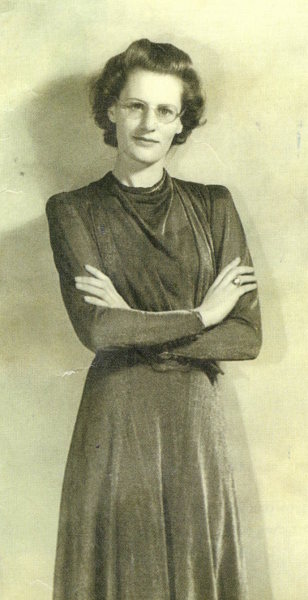
Near the end of Alive, Alive Oh!, her most recent book (in Diana Athill’s case one hesitates to use the word ‘last’) she writes: ‘The things life teaches you are not always valuable. Many people learn not to trust, not to hope, not to give. But if you are lucky in your circumstances – have loving parents, are spared extreme poverty or early exposure to loss, violence or frustration – and if you are equipped with a reasonable amount of natural wit, the chances are what it teaches will be useful.’ The message is already humming in these stories, written more than fifty years ago, none of them planned, ‘little outbreaks like those small hot springs that bubble up here and there in volcanic territory’ (Somewhere Towards The End), which, when she was already in her forties and considering herself a failure, unexpectedly revealed to her that she could write; and that made all the difference.

